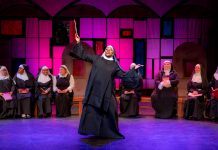This may come as a surprise to some, but I just recently — as in, within the last few months or so — got into “Harry Potter.”
This may come as a surprise to some, but I just recently — as in, within the last few months or so — got into “Harry Potter.”
I really can’t explain why I hadn’t gotten into it before. The books fit in quite well with my love of science fiction and fantasy — and the English setting is a definite plus. On top of that, J.K. Rowling really knows how to end a chapter on a cliffhanger, and some of the books feel more like mystery or suspense novels than stories about the adventures of a British schoolboy and his friends.
When Harry Potter first started to get popular, certain conservative groups decided that the books (and the movies and the miscellaneous Potter merchandise) were perhaps a bit too popular.
Some of the complaints sound like they come from people who have clearly never opened the pages of the novels — which is a common mistake made by pop culture warriors. No, you can not possibly learn witchcraft, spells or potions from reading “Harry Potter.” The books do not indoctrinate and they are certainly not satanic. The books are no more satanic than “MacBeth” with its three witches, or “The Wizard of Oz.”
But, if you dig a bit deeper, the “Harry Potter” books do expose a certain culture clash far more mainstream than just crackpots proclaiming “they promote witchcraft!”
If there is a wizard’s spell in the novels, it would be a charm to ward off closed-mindedness and discrimination.
Acceptance and tolerance are major themes found all throughout the books. And, to Rowlings’ credit, she does not apply these themes with a sledgehammer, but through clever metaphors.
Harry Potter’s world is divided up into wizards and non-magical muggles. Wizards try to stay hidden from the muggles, and for the most part, muggles are blissfully unaware that wizards and witches even exist. But some muggles are aware, and some, such as Harry’s own relatives, hate and mistrust wizards.
The situation, like so much in politics, is not black-and-white. Some wizards hate muggles. There is also discrimination within the wizarding world itself, with some tension between “pure-blood” wizard families and those with muggle relatives — and even between those who are curious about muggle culture, and those who want nothing to do with muggles. Eventually, we learn that there are also half-human wizards, with their own set of discrimination troubles on top of that. If this sounds familiar, it should.
While the “Harry Potter” books never directly lecture on such real-life topics as gay rights, gender equality, racial equality, religious freedom or human rights, they do very clearly take metaphoric stands in favor of these things. It’s all just cleverly disguised as fights against evil wizards, or against the anti-wizard intolerance of Harry’s aunt and uncle.
For people who are opposed to gay rights or gender equality, the biggest threat in “Harry Potter” is not the witchcraft or the magic spells, it’s the tolerance. But in our modern society, it is difficult to accuse a book of being too tolerant. So, they attacked the witchcraft instead.
Not that it really matters. “Harry Potter” will be around long after the attacks are forgotten about.
James Fujita is a former GVN news editor. He works as a copy editor for the Visalia Times-Delta in California’s Central Valley. Fujita can be contacted at jim61773@yahoo.com



















